Services- Phase I Environmental Site Assessment
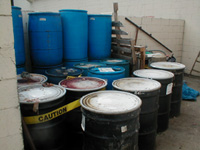 Phase I Environmental Site AssessmentPhase I Environmental Site Assessments are the cornerstone on any Environmental Due Diligence practice. A Phase I Environmental Site Assessment is THE standard for protecting property owners, property investors, and managers from environmental liability. Remediation Sciences is an expert at the implementation of the ASTM (American Society for Testing and Materials) guidelines and our diverse and extensive experience enables Remediation Sciences to offer our clients unique perspective on every property type. The ASTM Standard meets the United States Environmental Protection Agency (EPA) All Appropriate Inquiries rule. Remediation Sciences� attention to detail provides a thorough assessment that is delivered to our clients with the fastest turn around time possible. 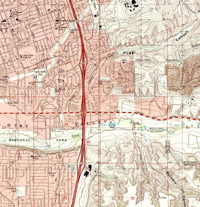 A Phase I Environmental Site Assessment will include the following: - Extensive Historical Records Review
- Title Records
- Aerial Photographs
- Fire Insurance Map
- Local Street Directories
- Historic Topographic Maps
- Property Tax Records
- Building Permits
- Zoning/Land Use Records
- Regulatory Agency Listings
- Geology and Hydrology Conditions
- Reviewed by licensed Geologist and Hydrologist
- Property and Area Reconnaissance
- Conducted by experienced site investigators
- Interviews of current, surrounding and former occupants/owners
- Other Unique requirements as needed by our clients
- Building Materials
- Threatened and Endangered Species
- Archaeological Resources
- Any other need a client may have
- Phase II Environmental Site Assessment
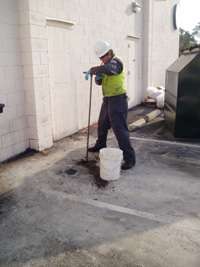 Phase II Environmental Site AssessmentA Phase II Environmental Site Assessment will be recommended if the results from the Phase I ESA or existing knowledge of chemical release indicate hazardous materials are likely found in the subsurface of the investigated property.
Prior to undertaking any Phase II ESAs, Remediation Sciences meets with our clients to make sure we understand the specific needs that our client�s have for requiring a Phase II ESA. We design our solutions to make sure our client�s needs are met while providing detailed reports that will be upheld under the most detailed review.
A typical Phase II ESA will include the collection of soil, soil gas, and/or groundwater samples from the property. A geophysical survey may also be conducted to verify the location of any unknown subsurface structures (such as underground storage tanks) that can be a source of hazardous materials. All of Remediation Sciences Phase II activities are overseen by a licensed professional, with all soil/water/soil gas analysis completed by a State Certified Laboratory.
Remediation Sciences has extensive experience in site assessment, soil gas intrusion evaluation and innovative investigation methods. This extensive experience enables Remediation Sciences to give expert analysis and detailed reports that give our clients a clear picture of the precise hazards that are present on their property. - Remedial Feasibility Study and Remediation
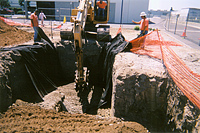 Remedial Feasibility Study and RemediationIn most projects the soil and/or groundwater remediation method is selected, based on Remediation Sciences� extensive experience. However, for large projects, remediation feasibility studies are conducted following the United States Environmental Protection Agency (EPA) �Guidance for Conducting Remedial Investigations or a Feasibility Studies under CERCLA.� A remedial action plan is prepared based on the feasibility study and laboratory based or site based pilot testing.
For Remediation projects, Remediation Sciences develops plans and specifications to meet our clients� specific needs. Our professionals manage construction activities and perform full program oversight. Remediation methods include in situ remediation (including bio remediation), soil vapor extraction, physical containment (including groundwater hydraulic control), and sub slab venting/depressurization. Remediation Sciences is also experienced in utilizing soil heating to remediate hydrocarbons from impacted soils. - Risk Assessment
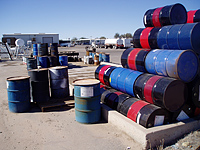 Risk AssessmentRemediation Sciences provides risk assessment services to appropriately solve our clients� unique and specific challenges. For most sites, generic risk levels are used to solve the problems. In large and complicated projects, a full human health risk assessment (HHRA) is conducted by a toxicologist. A site specific conceptual model is prepared for the site showing all of the chemical release mechanisms, exposure pathways, and potential receptors. Our toxicologists use the most current models of the HHRA. If remediation is required, the site remedial action plans are prepared based on HHRA, streamlining the process and providing the most cost effective solution for our clients. - Health and Safety
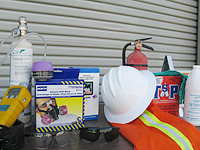 Health and SafetyRemediation Sciences� industrial hygienists have a wide range of experience, ensuring that each of our clients� projects is completed with specifications and requirements that are unique to their industry. All of our projects are conducted following site specific health and safety plans (HASP) prepared for each site HASP. Remediation Sciences conducts ambient air quality, job hazard analysis, health and safety plan preparation and HASP implementation support services. - Building Decontamination and Facility Closure Services
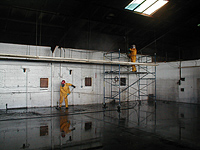 Building Decontamination and Facility Closure ServicesRemediation Sciences specializes in creating closure and decontamination plans for all types of industrial properties. The plans are prepared for approval by the various agencies that oversee site closure across a wide spectrum of industries. Buildings are decontaminated by pressure washing, vacuuming and removal of the appropriate building construction materials. Facility closure, wipe, concrete chip/concrete core samples and building materials are collected and tested. All wastes are transported to appropriate waste disposal or recycling facilities under waste disposal manifest protocols. Quality Assurance and Quality Control processes are diligently followed throughout the decontamination/closure process to ensure all work is done as efficiently and as cost effectively as possible. - National Pollution Discharge Elimination System (NPDES) Permitting & Sampling
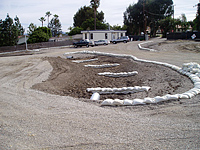 National Pollution Discharge Elimination System (NPDES) Permitting & SamplingRemediation Sciences offers a full suite of services to help our clients obtain NPDES permits for industrial and construction projects. NPDES permits are issued by states that have obtained EPA approval to issue permits or by EPA Regions in states without such approval. Remediation Sciences advises our clients through the necessary steps to obtain NPDES approval in addition to providing the sampling services that the approval is based on. From the development of compliance documentation through continued monitoring, Remediation Sciences helps our clients obtain and then maintain their NPDES permits. - Groundwater Supply Well Installation Inspection
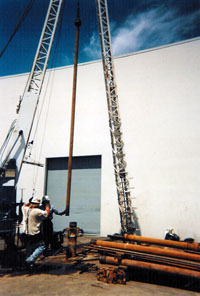 Groundwater Supply Well Installation InspectionRemediation Sciences assists our clients through all stages of groundwater supply well installation. From well permitting, drilling, pilot borings, soil sampling, soil logging, to down-hole geophysical logging, Remediation Sciences provides our clients a full service offering for all of their groundwater supply needs. Remediation Science can also assist with the design of the production well and perform short and long term aquifer testing as needed by our clients.
| | |
|




